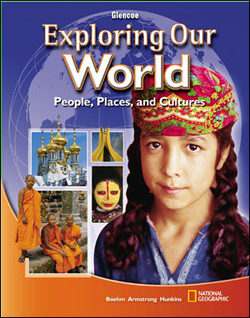
Exploring Our World: People, Places, and CulturesChapter 11: History and Cultures of EuropeChapter OverviewsThe story of European civilization begins with the ancient Greeks and Romans. The influence of the classical world spread throughout Europe and beyond to the present day. Greek civilization introduced the world's first democracy, while the Roman republic developed a code of laws that led to standards of justice still used today. Roman also helped spread Christianity throughout Europe, and many European languages, such as French, Italian, and Spanish, are based on Rome's language, Latin. Germanic people from the north invaded the Roman Empire and overthrew the last Roman emperor. The eastern part of the empire, known as the Byzantine Empire, lasted another 1,000 years. After Rome fell, Europe entered the Middle Ages. During this time, Christianity was central to people's lives. The Crusades, a series of religious wars fought against Muslims, attempted to take the Holy Land. During this time, the system of feudalism allowed kings to send armies of knights and peasants to help the Crusade cause: under feudalism, kings offered protection to knights in exchange for their service. Peasants, however, were only allotted a portion of land, and even then had to give part of their produce to the landowner. Although not successful, the Crusades did open Europe to trade with Muslim countries and to other cultural influences. They also helped to end feudalism. The Renaissance, which began in Italy in the late 1300s, brought new interest in learning to Europe. Its focus on classical culture as well as its emphasis on humanism led people to think about religion and faith in new ways. In 1517, this led to the Reformation, a movement that brought the new Christian religion of Protestantism to many parts of Europe. As the Roman Catholic Church was weakened, kings and queens became more powerful. Their power and wealth led them to fund explorations of Asia, Africa, and the Americas and eventually to establish colonies. But when people began to question the authority of monarchs, several events brought about Europe's modern period. The Enlightenment promoted reason over faith and science over belief. The Industrial Revolution in the 1800s encouraged workers to move to cities for factory work. Wealth increased but so did conflict. In the 1900s, two world wars devastated Europe. Today, although Europe has more than 40 individual countries, the European Union has brought unity to the continent. Europeans tend to be well educated and have higher incomes than much of the rest of the world. European society and culture are more secular, but most European Christians still belong to the Roman Catholic Church, and religion has inspired art and literature throughout the centuries. |  |















